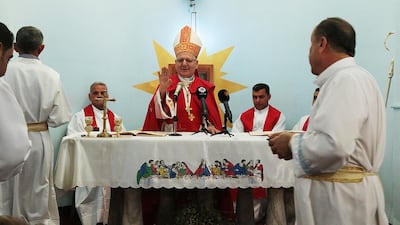MALABARWAN, IRAQ // The congregation sat crammed on the narrow wooden benches of the small church, waiting for their special guest to make an entry. A convoy of armoured SUVs already stood parked on the unpaved road next to the church, and soon enough a diminutive man led a group of robed priests into the building. Mar Louis Raphael Sako, the patriarch of Chaldean Christians in Iraq, had come to the village of Malabarwan to perform the rites on Maundy Thursday.
Wearing a red cassock and mitre, the patriarch headed to the altar to begin proceedings. A little later, the choir launched into a full throated Hallelujah, sung in Aramaic, the language spoken by the first Christians more than 2,000 years ago.
The Easter ritual keeps alive an age old Christian culture in Iraq. Malabarwan is a nondescript village on the edge of the fertile Nineveh plains in the country’s north, where Christian settlements have stood since the religion came to the area in the first century AD.
Since the rise of Islamist terrorism after the US invasion in 2003, Christian communities in major cities are disappearing fast, and the remote villages and towns that lie in Kurdish-controlled territory are among the few sanctuaries left to the religious minority. Their rising importance to the community explains why Patriach Sako has come to celebrate mass at Malabarwan.
Before the second Gulf War, there were only a few old-timers in the all-but deserted village, living among the abandoned houses of their neighbours, who had moved to the city of Mosul about 30 kilometres away.
But the invasion and subsequent occupation unleashed a wave of extremist terror, directed at the western conquerors but also against other Muslims and Iraqis of other faiths. A spate of bombings and assassinations targeting Christians caused many to leave the country. Precise numbers are hard to come by, but some estimates say Iraq’s Christian population has dwindled from 1.5 million in 2003 to around 500,000 now.
In seeking safety, Christians in Baghdad or Basra had no option but to leave the country or move to the autonomous Kurdish region, which was largely spared the insurgency. For Mosul’s Christians, the ancient Assyrian settlements that straddle the city to the north offered a more proximate sanctuary.
A return to their ancestral homes provided a refuge to the former inhabitants of Malabarwan, and by 2007 — the height of an Al Qaeda-led insurgency that was eventually quashed by the US military — around half of the families had moved back, according to Father Efraim, who came to the village as part of the patriach’s entourage.
“Because they suffered persecution, many left the city and came here,” he says. Father Efraim fled Mosul in 2007 after the city’s bishop was murdered and a string of priests had been killed in the city, and now lives in the Christian district of Erbil, the Kurdish capital.
The priest estimates that approximately 30,000 Christians lived in Mosul before the post-war terror. When ISIL stormed Mosul in 2014, the remaining Christians took flight, and Malabarwan filled up with the families that had left for the city a generation or two earlier, completing a remarkable process of reverse urbanisation.
“We used to come back here for vacations. Only three or four houses were occupied, with one or two old people living there,” says Wael, a 33 year-old IT engineer.
Wael came to the village in 2006 with his parents, sick of a city that had become dysfunctional through extremist violence and a heavy-handed response by the security forces. He remembers the endless hours lost commuting as countless checkpoints inhibited the flow of traffic even as terrorist attacks against religious minorities continued unabated.
“I will never, ever return to Mosul,” he says firmly.
Around 100 families live in Malabarwan now, says Wael. All have roots in the village. About 60 of them arrived in 2014, he estimates.
Patriarch Sako believes they have a future in the rural backwater.
“In Mosul it will be difficult, but villages like this one are totally Christian, and they can live here,” says the patriarch after finishing his Easter sermon. As the head of the Chaldean church, the most widely followed Christian denomination in Iraq, he is hopeful that the ancient community will survive.
But in the remote villages, jobs are difficult to come by, especially at a time when a slump in the oil price and the war against ISIL has sent the economy into tailspin.
“We have electricity and it is safe here, but most people don’t have jobs,” says Wael, who was fortunate enough to find work in the nearby town of Akre.
After years as victims of extremism, most Christians in Iraq have lost faith in a peaceful coexistence. Many of the recent arrivals at Malabarwan may soon be on their way again, seeking safety and opportunities in Europe or the US.
“The situation is not stable here. If you stay, you are always at risk,” says Wael. “The Christians have no future here, we always fear that something will happen.”
foreign.desk@thenational.ae

